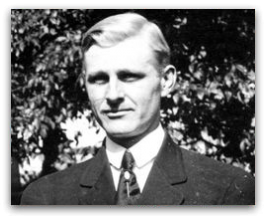Main menu
- ‘Abdu’l-Bahá’s Journey
- World Peace
- Stopping Racism in America
- Empowerment of Women
- More Principles...
- Prayer for America
Fred Mortensen

Repentance and Renewal: The story of Fred Mortensen
Fred Mortensen had traveled to Maine, where ‘Abdu’l-Bahá was staying, the only way he could—by “riding the rods.” He rode underneath and on top of coal-fired railroad cars, from Minnesota to Portsmouth, New Hampshire, then traveled across the river, arriving in filthy clothing at Green Acre, Maine.
Fred had been a petty criminal and a fugitive from justice. As Saint Augustine stole some pears at his life’s lowest point, Fred got into trouble when he broke a store window and stole a mailbag; but this event also led him to the man who gave him the Bahá’í message. His defense lawyer, an eminent Bahá’í named Albert Hall, told him “hour after hour, about the great love of ‘Abdu’l-Bahá for all his children, and that He was here to help us show that love for our fellowmen.” Fred said, “Honestly, I often wondered then what Mr Hall meant when he talked so much about love, God’s love, Bahá’u’lláh’s love, ‘Abdu’l-Bahá’s love…”
Fred lived in Minneapolis, and ‘Abdu’l-Bahá was at the Green Acre School on the East Coast. Learning that ‘Abdu’l-Bahá might not come west, Fred did not want to miss the opportunity to meet Him—but he lacked the funds to purchase a train ticket. In his words, “As my finances were low I of necessity must hobo my way to Green Acre.” He rode the rails to the East Coast. He gives this account of the last leg of his journey, and of his meeting with ‘Abdu’l-Bahá:
“The Boston and Maine Railway was the last link between ‘Abdu’l-Bahá and the outside world so it seemed to me, and when I crawled off from the top of one of its passenger trains at Portsmouth, New Hampshire, I was exceedingly happy. A boat ride, a street car ride, and there I was, at the gate of Paradise. My heart beating double time.”
Fred’s first encounter with ‘Abdu’l-Bahá was not what he expected.
Arriving at the Inn at Green Acre where ‘Abdu’l-Bahá was staying—now known as the Sarah Farmer Inn—Fred stood, “head to foot … covered with soot. His blue eyes stared out from a dark gray face.” He was embarrassed by his own appearance, and by his means of transport. He approached ‘Abdu’l-Bahá and his secretaries. Someone said, “Here he comes, now.” One of ‘Abdu’l-Bahá’s secretaries introduced Fred to ‘Abdu’l-Bahá. Fred continues,“To my astonishment He looked at me and only said, ‘Ugh! Ugh!’ not offering to shake hands with me. “Coming as I had, and feeling as I did, I was very much embarrassed.” ‘Abdu’l-Bahá then called Fred to His room on the third floor of the Inn where they spoke privately through an interpreter. “He welcomed me with a smile and a warm hand-clasp … His first words were ‘Welcome! Welcome! You are very welcome,’ –then, ‘Are you happy?’ – which was repeated three times. I thought, why do you ask me that so many times? Of course I am happy… Then, ‘Abdu’l-Bahá asked,
‘Where did you come from?’
Answer: ‘From Minneapolis.’…
Question: ‘Did you have a pleasant journey?’”
Fred continues, “Of all the questions I wished to avoid this was the one! I dropped my gaze to the floor—and again He put the question. I lifted my eyes to His, and His were as two black, sparkling jewels, which seemed to look into my very depths. I knew He knew and I must tell… ‘Riding under and on top of railway cars.’ … ‘Explain how.’ Now as I looked into the eyes of ‘Abdu’l-Bahá I saw they had changed and a wondrous light seemed to pour out. It was the light of love and I felt relieved and very much happier. I explained to Him how I rode on the trains, after which He kissed both my cheeks, gave me much fruit, and kissed the dirty hat I wore…”
‘Abdu’l-Bahá arranged for Fred to have new clothing. He remained in ‘Abdu’l-Bahá’s company for several days at Green Acre, and afterwards was invited to accompany Him to the Boston area for a week. Later, when ‘Abdu’l-Bahá traveled to Minneapolis, Fred again saw him.
Fred recognized Bahá’u’lláh as the Manifestation of God for this Age, completely reformed, married, and dedicated his life to promoting the Bahá’í Faith. Fred and his wife Kathryn raised four children, all of whom followed the path of their parents and became Bahá’ís. ‘Abdu’l-Bahá had promised God would give Fred “four blessings,” and in time Fred found out what this statement meant.
Later in life, Fred particularly focused on promoting the principle of the oneness of humanity, and worked to improve race relations in such cities as Atlanta, Georgia, and Helena, Montana.
The degree of the change of character wrought in Fred Mortensen by the Word of God, is shown by the fact that when funds needed to be transferred to the Holy Land during the First World War, ‘Abdu’l-Bahá selected Fred Mortensen to be the courier.
Fred wrote:
“These events are engraved upon the tablet of my heart and I love every moment of them. The words of Bahá’u’lláh are my food, my drink, and my life. I have no other aim than to be of service in His pathway and to be obedient to His Covenant.”
Sources: “‘Abdu’l-Bahá in Their Midst,” by Earl Redman; Master’s Thesis by Justin Charles Martin Penoyer, Fred Mortensen’s great-grandson









